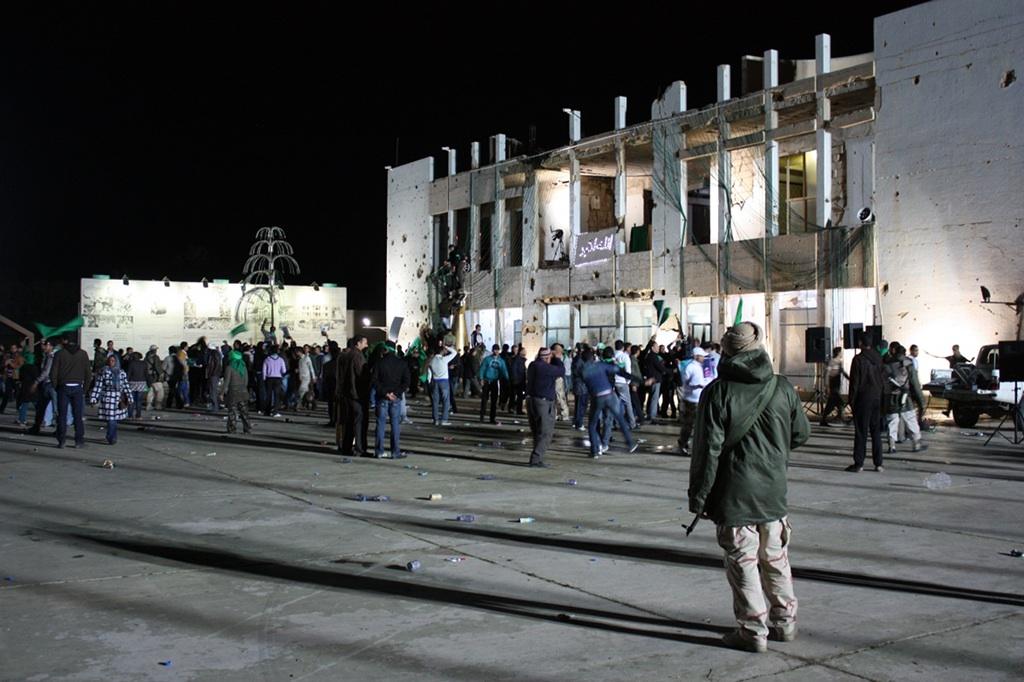Libya: NATO bombs Gaddafi’s offices in Tripoli (VIDEO) (UPDATES)
People mill around near Libyan leader Moamer Kadhafi’s residence after a missile destroyed an administrative building in the Libyan leader’s complex in Tripoli on March 20, 2011. The building which was about 50 meters (165 feet) from the tent where Kadhafi generally meets guests was flattened.
In what it called a "precision strike," NATO sent at least two large guided bombs into the military complex of Muammar Gaddafi in Tripoli early Monday, destroying offices and a library used by the Libyan leader.
Meanwhile, Alex Leff of GlobalPost reports that Nicaragua has firmed up as a plausible destination for Gaddafi were he to flee Libya.Nicaragua's president, Daniel Ortega, among the world's few open Gaddafi supporters, is reported to have a nephew of the Libyan leader in the Sandinista administration.
A U.S. diplomatic cable leaked in a Costa Rican and Nicaraguan newspapers today suggests that Ortega tapped Muhamad Muhktar Lashtar — a naturalized Nicaraguan believed to be linked to Libyan secret intelligence — as his personal secretary.
Gaddafi's whereabouts at the time of Monday's NATO attack, just after midnight on his sprawling Bab al-Azizia, compound were unclear.
Al-Jazeera quoted a government spokesman, Mousa Ibrahim, as saying three people were killed. Another official, who accompanied journalists to the scene, said 45 people were wounded, 15 seriously.
In a statement, the alliance described the attack as “precision strike” on a communications headquarters used by the regime to attack civilians, but Libyan officials said it was an attempt to assassinate their leader, the Washington Post reported.
The blasts were among the biggest in the capital so far, according to BBC correspondents.
Gaddafi's son, Saif al-Islam, reportedly condemned the "cowardly" attack.
"I would like to say that it is possible this attack would scare young boys and girls. That's something, but we are not going to surrender or wave the white flag and we are not scared," he told Libyan state TV.
"You, NATO, are surrounded by agents, traitors and spies, while Muammar Gaddafi is surrounded by millions. So I tell you now that you are losing the battle. History has proved that no state can rely on them to win."
In Misurata, 132 miles east of Tripoli, a captured pro-Gaddafi soldier told Agence France-Presse that loyalist forces were losing their battle against the rebels, and residents were able to venture from their homes for the first time in days.
"Many soldiers want to surrender but they are afraid of being executed [by rebels]," said Lili Mohammed, a Mauritanian hired to fight the insurgents.
On Sunday, Libyan Deputy Foreign Minister Khaled Kaim said the army was pausing their attacks on Misurata to allow local tribes to settle the battle "peacefully and not militarily."
But the city was reportedly still rocked by a salvo of Grad rockets and bursts of automatic weapons.
Every day, reporters and producers at The World are hard at work bringing you human-centered news from across the globe. But we can’t do it without you. We need your support to ensure we can continue this work for another year.
Make a gift today, and you’ll help us unlock a matching gift of $67,000!
